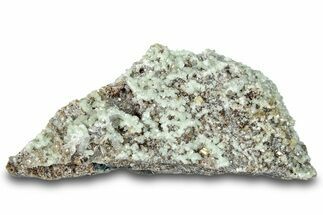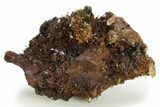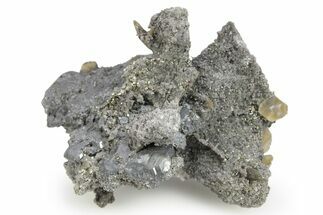This Specimen has been sold.
2.6" Lazulite Cluster with Siderite and Quartz - Yukon, Canada
This is the first lazulite we've ever offered at FossilEra! This is a gorgeous cluster of lustrous, deep blue lazulite crystals with gold-brown siderite and colorless quartz from the famous lazulite deposits of Rapid Creek in Yukon, Canada.
Lazulite is a blue phosphate mineral that contains magnesium, iron, and aluminum phosphates. Though it can be easily confused for lazurite and its copper-derived cousins, lazulite is a completely different mineral. It can form massive or monoclinic crystal structures in granite pegmatities and some metamorphic rocks, and is often found in associations with quartzites and quartz veins. Its name is loosely derived from 'azraq, the Arabic word for blue, and its type locality is Freßnitzgraben in southeastern Austria.
Lazulite is mined in its massive form around the world, but gem-quality localities can be found in the Alps, as well as Pakistan and Canada's Yukon province. Its appealing blues and moderate hardness make it a great choice for faceting and lapidary work.
Lazulite is mined in its massive form around the world, but gem-quality localities can be found in the Alps, as well as Pakistan and Canada's Yukon province. Its appealing blues and moderate hardness make it a great choice for faceting and lapidary work.
Siderite, also known as "chalybite", is an iron carbonate mineral that belongs to the calcite group. It can contain a wide variety of impurities, including manganese, magnesium, calcium, zinc, and cobalt. Brown hues are typical for siderite, though occasional specimens can be white and gray. It can occur as rhombohedral crystals with rounded faces, and as scalenohedral crystals in rare cases. Botryoidal, concretionary, massive, stalactitic, and mammillary are some of the more common formations of siderite.
Since siderite is such a prevalent mineral, it can be found all around the world in a wide variety of colors and formations. The Morro Velho Mine in Minas Gerais, Brazil is noteworthy for producesing beautiful gemmy siderite specimens. The crystals collected from here are often translucent yellow-green in color, and form in association with dolomite, cubanite, pyrrhotite, and chalcopyrite.
The chemical formula of siderite is FeCO3, with the variable formula including manganese, magnesium, calcite, zinc and cobalt ((Fe,Mg,Ca,Mn,Zn,Co)CO3).
Since siderite is such a prevalent mineral, it can be found all around the world in a wide variety of colors and formations. The Morro Velho Mine in Minas Gerais, Brazil is noteworthy for producesing beautiful gemmy siderite specimens. The crystals collected from here are often translucent yellow-green in color, and form in association with dolomite, cubanite, pyrrhotite, and chalcopyrite.
The chemical formula of siderite is FeCO3, with the variable formula including manganese, magnesium, calcite, zinc and cobalt ((Fe,Mg,Ca,Mn,Zn,Co)CO3).
SPECIES
Lazulite, Siderite & Quartz
LOCATION
Rapid Creek, Dawson Mining District, Yukon, Canada
SIZE
2.6" wide
CATEGORY
ITEM
#283023
 Reviews
Reviews














